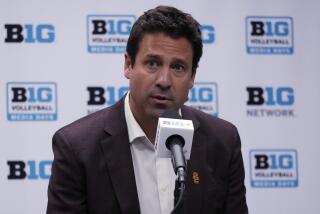SOLID HUGH
- Share via
Life has settled down somewhat for Hugh McCutcheon, the man for whom the Beijing Olympics became the best of times and the worst of times.
He is home in Irvine, but also back in Minnesota frequently, where his mother-in-law, Barbara Bachman, has recovered from the stab wounds she suffered in the attack at a tourist spot. The same attacker, Tang Yongming, killed her husband, Todd, the 62-year-old chief executive of a Minnesota gardening business.
McCutcheon says his wife, Elisabeth, “has good days and bad days,” that her mother has her two older daughters living right next door in Minnesota, and that yes, as the youngest of three Bachman daughters, Wiz, his wife, was daddy’s girl.
“She is the sweetest woman in the world,” adds the 39-year-old McCutcheon.
As the inevitable momentum of life pulls him forward, McCutcheon admits to having frequent moments of amazement over what happened to him, his family and his volleyball team in Beijing, and how it changed him, probably forever.
“There is no page in the book of life,” he says, “that tells you how to be a gold-medal winner and have your father-in-law murdered.”
When it gets too overwhelming, he thinks about it as a “testament to the randomness of life.”
A little more than five months ago, McCutcheon was just another coach on another U.S. Olympic team that United States viewers might get a glimpse of between long doses of Kobe and Michael Phelps. You find out about USA Volleyball once every four years, and they better be very good or you won’t find out a lot.
It turned out both teams were very good, the women winning a silver medal and McCutcheon’s men beating Brazil for the gold.
It also turned out that McCutcheon, a native of New Zealand and a newcomer to the top job in USA Volleyball, would have to navigate the most difficult of situations imaginable with an international spotlight shining on him.
The attack on Todd and Barbara Bachman, as well as their Chinese guide, took place the day after the opening ceremony. Had they been tourists from any country, it would have been a story. But when the victims were the in-laws of a U.S. coach, attacked in a country that flaunts militarism and had stressed security, it was front-page and network news.
McCutcheon was thrust onto a stage where the bright lights usually blind and paralyze even the best-prepared. Not McCutcheon, who just kept doing the right thing, right to the end.
He immediately handed the volleyball duties to his assistants and attended to the family business of a dead father-in-law and a badly injured mother-in-law, who eventually was able to be flown home for continued treatment.
The men’s volleyball team started playing and kept on winning in pool play. McCutcheon remained in Minnesota until Barbara Bachman’s condition stabilized. Eventually, pushed out the door by family in Minnesota, he returned to an unbeaten volleyball team.
Even now, that amazes him.
“I was at a conference in Australia in October,” he says, “and a former volleyball player I know came up to me and said, ‘You guys could have coughed it all up in the corners and nobody would have thought a thing about it.’ ”
Instead, McCutcheon’s team beat Russia in the semifinals and came back from a set down in the final to beat Brazil for the gold medal.
Again, McCutcheon could have used the circumstance to take a quick bow and bow out. Many would have expected that. But moments after match point, he stepped off the court, gathered himself and then reappeared to be with his players and fulfill his media commitments.
“When I stepped away there,” he says, “I had to make sure I wasn’t going to lose it on national TV.”
When he came back, celebrated with his team, patiently dealt with the media and even helped shape the coverage by gently reminding people writing stories that this one was about a team that had worked four years for the gold medal it had just won, he had a reason.
“If I don’t,” he says, “then the bad guy wins.”
If McCutcheon let the story of a USA Volleyball gold medal remain more a story of a murder, then the bad guy, or in this case the apparent mentally ill attacker, remains the focus.
McCutcheon will never totally put Beijing behind him, nor will he want to as far as the gold-medal memories are concerned. But he has moved on.
Recently, USA Volleyball named him the coach of the women’s team for the next Olympiad, and McCutcheon says he not only likes the challenge of building something new from start to finish, but he sees a professional advantage to his resume this way.
“Men’s volleyball is kind of a niche sport in this country,” he says, adding that there are only 21 men’s Division I college volleyball teams and 325 women’s teams.
“When the Olympics are over in London [in 2012], I’ll be 42 years old and looking for a job in college sports administration,” he says. “I hope this will help.”
The men’s team trains at the American Sports Center in Anaheim, a 5-year-old, privately owned building that currently houses the largest wood floor in the world. The women’s team trains at Colorado Springs, but McCutcheon is hoping -- pushing for it -- to move to Anaheim too.
Anaheim is so happy with being volleyball central, as well as having McCutcheon around, that it put him on its float for this year’s Rose Parade.
That’s pretty heady territory for a volleyball coach, but then, in circumstances unlike anything his peers have faced, McCutcheon proved he is much more than that.
--
More to Read
Go beyond the scoreboard
Get the latest on L.A.'s teams in the daily Sports Report newsletter.
You may occasionally receive promotional content from the Los Angeles Times.







